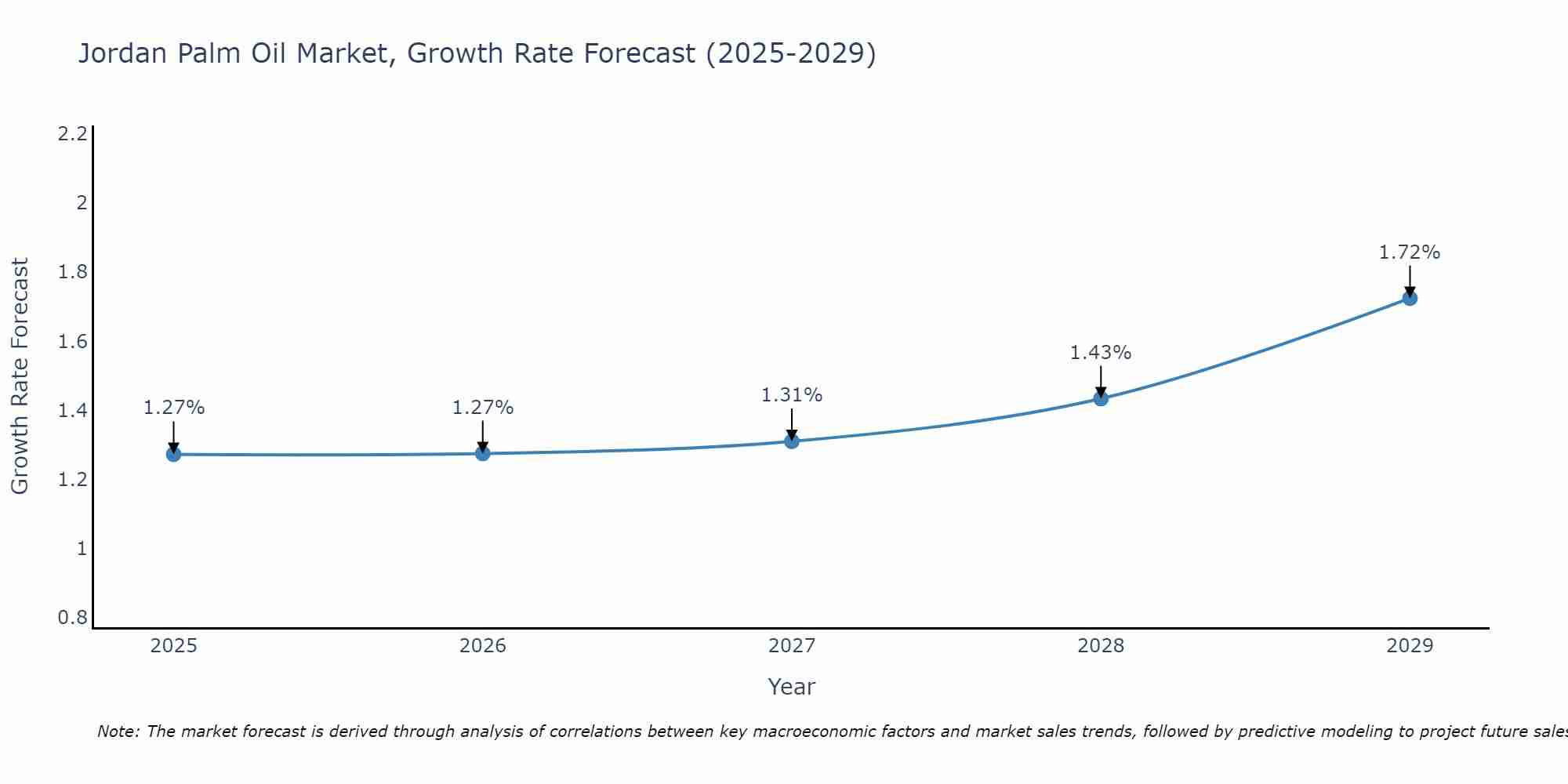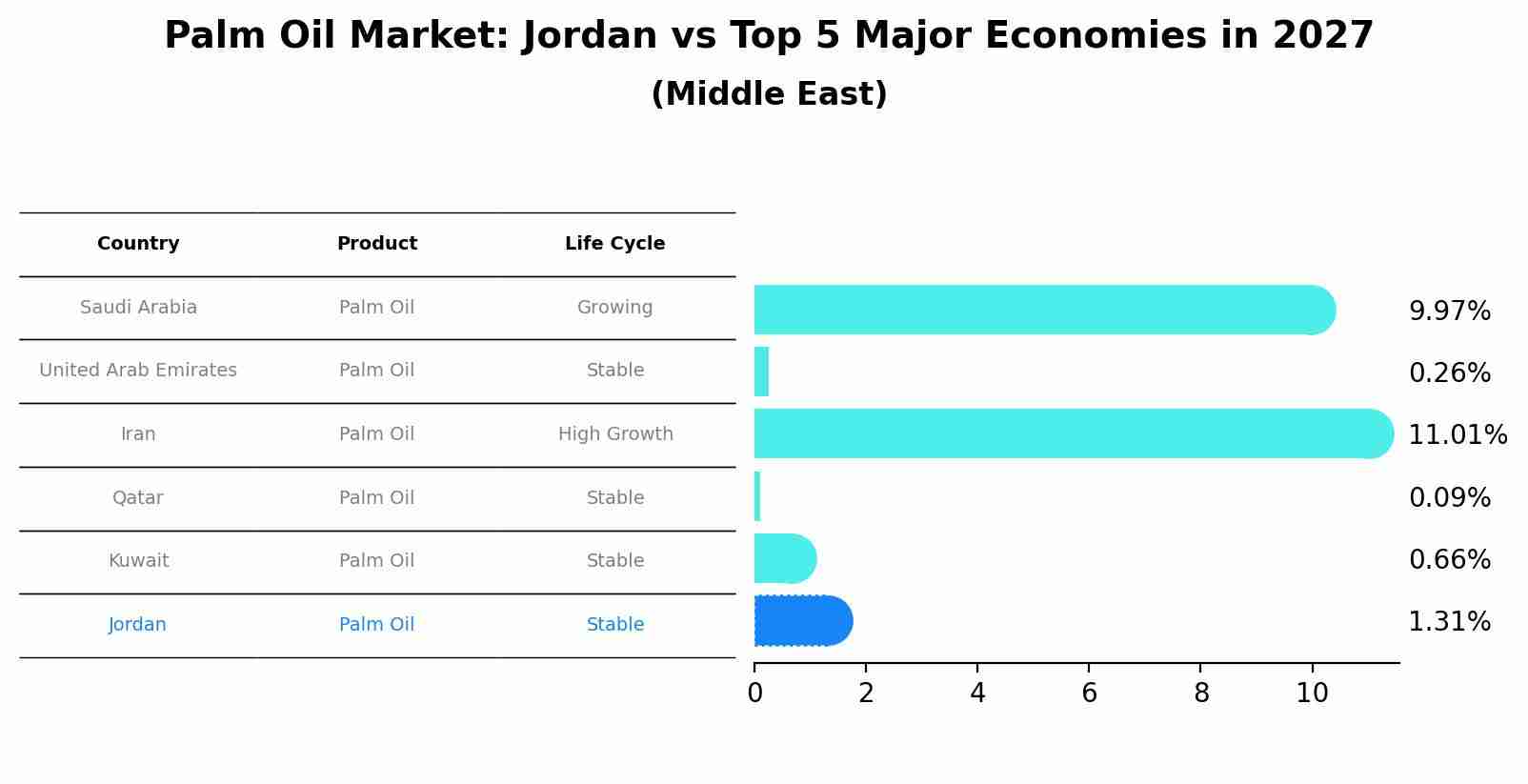Jordan Palm Oil Market Outlook | Share, Size, Analysis, Value, Trends, Industry, Companies, Revenue, Growth, COVID-19 IMPACT & Forecast
| Product Code: ETC383806 | Publication Date: Aug 2022 | Updated Date: Jul 2025 | Product Type: Market Research Report | |
| Publisher: 6Wresearch | Author: Vasudha | No. of Pages: 75 | No. of Figures: 35 | No. of Tables: 20 |
Jordan Palm Oil Market Size Growth Rate
The Jordan Palm Oil Market is likely to experience consistent growth rate gains over the period 2025 to 2029. Commencing at 1.27% in 2025, growth builds up to 1.72% by 2029.

Palm Oil Market: Jordan vs Top 5 Major Economies in 2027 (Middle East)
In the Middle East region, the Palm Oil market in Jordan is projected to expand at a stable growth rate of 1.31% by 2027. The largest economy is Saudi Arabia, followed by United Arab Emirates, Iran, Qatar and Kuwait.

Jordan Palm Oil Market Synopsis
The Jordan Palm Oil market is characterized by a growing demand for palm oil due to its versatile applications in food processing, cosmetics, and biofuels. Despite being a relatively small market compared to other regions, Jordan imports a significant amount of palm oil to meet the needs of its population. The market is influenced by factors such as changing consumer preferences, government regulations, and global supply chains. Sustainability concerns and increasing awareness about the environmental impacts of palm oil production have also led to a shift towards certified sustainable palm oil in the market. Overall, the Jordan Palm Oil market presents opportunities for suppliers to cater to the diverse needs of industries while also addressing sustainability concerns to meet evolving consumer demands.
Jordan Palm Oil Market Trends
Currently, the Jordan Palm Oil Market is experiencing a shift towards sustainable and responsibly sourced palm oil due to growing consumer awareness and environmental concerns. Companies are increasingly adopting certifications such as RSPO (Roundtable on Sustainable Palm Oil) to demonstrate their commitment to sustainable sourcing practices. There is also a rising demand for organic and non-GMO palm oil products in the market. Health-conscious consumers are driving the trend towards healthier alternatives to traditional cooking oils, leading to the introduction of palm oil products with lower saturated fat content. Additionally, the food industry in Jordan is incorporating palm oil in various products due to its versatility and cost-effectiveness, further driving market growth. Overall, the Jordan Palm Oil Market is witnessing a transition towards sustainability, health-consciousness, and product innovation to meet evolving consumer preferences.
Jordan Palm Oil Market Challenges
One of the main challenges faced in the Jordan Palm Oil Market is the increasing consumer awareness and concerns regarding the environmental and ethical implications of palm oil production. Consumers are becoming more conscious of the negative impact of palm oil cultivation on deforestation, wildlife habitats, and indigenous communities, leading to a growing demand for sustainably sourced palm oil products. This presents a challenge for companies operating in the Jordan market as they need to ensure transparency in their supply chains and demonstrate their commitment to sustainable and responsible sourcing practices. Additionally, the relatively small size of the Jordan market compared to other regions makes it challenging for companies to achieve economies of scale and compete effectively in terms of pricing and product availability.
Jordan Palm Oil Market Investment Opportunities
Investment opportunities in the Jordan Palm Oil Market include establishing palm oil plantations, investing in palm oil processing facilities, and entering the market as a distributor of palm oil products. Jordan relies heavily on imports to meet its palm oil demand, presenting an opportunity for local production to reduce dependency on foreign sources. The growing awareness of the health benefits and versatile uses of palm oil in various industries such as food, cosmetics, and biofuels further enhances the market potential. Additionally, sustainable and environmentally friendly practices in palm oil production are gaining importance globally, making investments in sustainable palm oil production methods a lucrative opportunity in the Jordan market. Collaborating with local farmers and stakeholders to promote responsible palm oil cultivation could also be a promising investment avenue.
Jordan Agar Market Government Policies
The Jordanian government has implemented policies regarding the palm oil market to regulate imports and ensure food safety. Import restrictions and quality standards are in place to protect consumers from harmful chemicals and ensure that products meet specified health and safety criteria. Additionally, there are regulations in place to monitor and control the pricing of palm oil products to prevent price manipulation and ensure fair competition in the market. The government also encourages the use of sustainable practices in palm oil production to minimize environmental impact and promote responsible sourcing. Overall, these policies aim to safeguard consumer interests, promote market transparency, and support sustainable economic growth in the Jordan palm oil market.
Jordan Palm Oil Market Future Outlook
The future outlook for the Jordan Palm Oil Market appears to be positive, driven by increasing consumer awareness of the health benefits and versatile applications of palm oil in various industries such as food, cosmetics, and biofuels. The growing population and rising disposable incomes in Jordan are expected to further boost the demand for palm oil products. However, the market may face challenges related to sustainability and environmental concerns, prompting a shift towards more sustainable sourcing practices. Companies operating in the Jordan Palm Oil Market are likely to focus on sustainability initiatives and certifications to meet consumer expectations and regulatory requirements, ensuring long-term growth and market competitiveness. Overall, the market is expected to witness steady growth with a greater emphasis on sustainable practices and ethical sourcing.
Key Highlights of the Report:
- Jordan Palm Oil Market Outlook
- Market Size of Jordan Palm Oil Market, 2021
- Forecast of Jordan Palm Oil Market, 2031
- Historical Data and Forecast of Jordan Palm Oil Revenues & Volume for the Period 2018 - 2031
- Jordan Palm Oil Market Trend Evolution
- Jordan Palm Oil Market Drivers and Challenges
- Jordan Palm Oil Price Trends
- Jordan Palm Oil Porter's Five Forces
- Jordan Palm Oil Industry Life Cycle
- Historical Data and Forecast of Jordan Palm Oil Market Revenues & Volume By Nature for the Period 2018 - 2031
- Historical Data and Forecast of Jordan Palm Oil Market Revenues & Volume By Organic for the Period 2018 - 2031
- Historical Data and Forecast of Jordan Palm Oil Market Revenues & Volume By Conventional for the Period 2018 - 2031
- Historical Data and Forecast of Jordan Palm Oil Market Revenues & Volume By Product for the Period 2018 - 2031
- Historical Data and Forecast of Jordan Palm Oil Market Revenues & Volume By CPO for the Period 2018 - 2031
- Historical Data and Forecast of Jordan Palm Oil Market Revenues & Volume By RBD Palm Oil for the Period 2018 - 2031
- Historical Data and Forecast of Jordan Palm Oil Market Revenues & Volume By Palm Kernel Oil for the Period 2018 - 2031
- Historical Data and Forecast of Jordan Palm Oil Market Revenues & Volume By Fractionated Palm Oil for the Period 2018 - 2031
- Historical Data and Forecast of Jordan Palm Oil Market Revenues & Volume By End-use for the Period 2018 - 2031
- Historical Data and Forecast of Jordan Palm Oil Market Revenues & Volume By Food & Beverage for the Period 2018 - 2031
- Historical Data and Forecast of Jordan Palm Oil Market Revenues & Volume By Personal Care & Cosmetics for the Period 2018 - 2031
- Historical Data and Forecast of Jordan Palm Oil Market Revenues & Volume By Biofuel & Energy for the Period 2018 - 2031
- Historical Data and Forecast of Jordan Palm Oil Market Revenues & Volume By Pharmaceuticals for the Period 2018 - 2031
- Historical Data and Forecast of Jordan Palm Oil Market Revenues & Volume By Others for the Period 2018 - 2031
- Jordan Palm Oil Import Export Trade Statistics
- Market Opportunity Assessment By Nature
- Market Opportunity Assessment By Product
- Market Opportunity Assessment By End-use
- Jordan Palm Oil Top Companies Market Share
- Jordan Palm Oil Competitive Benchmarking By Technical and Operational Parameters
- Jordan Palm Oil Company Profiles
- Jordan Palm Oil Key Strategic Recommendations
Frequently Asked Questions About the Market Study (FAQs):
- Single User License$ 1,995
- Department License$ 2,400
- Site License$ 3,120
- Global License$ 3,795
Search
Thought Leadership and Analyst Meet
Our Clients
Related Reports
- Afghanistan Rocking Chairs And Adirondack Chairs Market (2026-2032) | Size & Revenue, Competitive Landscape, Share, Segmentation, Industry, Value, Outlook, Analysis, Trends, Growth, Forecast, Companies
- Afghanistan Apparel Market (2026-2032) | Growth, Outlook, Industry, Segmentation, Forecast, Size, Companies, Trends, Value, Share, Analysis & Revenue
- Canada Oil and Gas Market (2026-2032) | Share, Segmentation, Value, Industry, Trends, Forecast, Analysis, Size & Revenue, Growth, Competitive Landscape, Outlook, Companies
- Germany Breakfast Food Market (2026-2032) | Industry, Share, Growth, Size, Companies, Value, Analysis, Revenue, Trends, Forecast & Outlook
- Australia Briquette Market (2025-2031) | Growth, Size, Revenue, Forecast, Analysis, Trends, Value, Share, Industry & Companies
- Vietnam System Integrator Market (2025-2031) | Size, Companies, Analysis, Industry, Value, Forecast, Growth, Trends, Revenue & Share
- ASEAN and Thailand Brain Health Supplements Market (2025-2031) | Strategy, Consumer Insights, Analysis, Investment Trends, Opportunities, Growth, Size, Share, Industry, Revenue, Segments, Value, Segmentation, Supply, Forecast, Restraints, Outlook, Competition, Drivers, Trends, Demand, Pricing Analysis, Competitive, Strategic Insights, Companies, Challenges
- ASEAN Bearings Market (2025-2031) | Strategy, Consumer Insights, Analysis, Investment Trends, Opportunities, Growth, Size, Share, Industry, Revenue, Segments, Value, Segmentation, Supply, Forecast, Restraints, Outlook, Competition, Drivers, Trends, Demand, Pricing Analysis, Competitive, Strategic Insights, Companies, Challenges
- Europe Flooring Market (2025-2031) | Outlook, Share, Industry, Trends, Forecast, Companies, Revenue, Size, Analysis, Growth & Value
- Saudi Arabia Manlift Market (2025-2031) | Outlook, Size, Growth, Trends, Companies, Industry, Revenue, Value, Share, Forecast & Analysis
Industry Events and Analyst Meet
Whitepaper
- Middle East & Africa Commercial Security Market Click here to view more.
- Middle East & Africa Fire Safety Systems & Equipment Market Click here to view more.
- GCC Drone Market Click here to view more.
- Middle East Lighting Fixture Market Click here to view more.
- GCC Physical & Perimeter Security Market Click here to view more.
6WResearch In News
- Doha a strategic location for EV manufacturing hub: IPA Qatar
- Demand for luxury TVs surging in the GCC, says Samsung
- Empowering Growth: The Thriving Journey of Bangladesh’s Cable Industry
- Demand for luxury TVs surging in the GCC, says Samsung
- Video call with a traditional healer? Once unthinkable, it’s now common in South Africa
- Intelligent Buildings To Smooth GCC’s Path To Net Zero


















